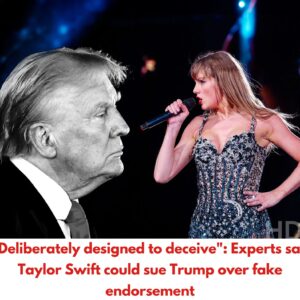Donald Trump; Taylor Swift Photo illustration by Salon/Getty Images
Taylor Swift could bring a lawsuit against former President Donald Trump for posting her image and falsely accepting her endorsement — but legal experts told Salon that the issue raises questions about free speech and Trump’s reputation for hyperbole.
In a Monday post on Trump’s social media network, the Republican presidential nominee shared four images that included pictures of women in “Swifties for Trump” t-shirts and an A.I. image of Taylor Swift that read: “Taylor wants you to vote for Donald Trump.”
Trump wrote on the post: “I accept!”
University of Michigan law professor Jessica Litman said Swift could bring a false endorsement claim under section 43(a) of the Lanham Trademark Act, or a right of publicity claim for commercial misuse of her name and face under state law.
“In practice, there’s not much to be gained by filing suit,” Litman said. “The news media has reported that Swift did not in fact endorse Trump, and while Mr. Trump may have believed that the endorsement images were genuine, nobody else seems to have believed that.”
Litman said Trump would likely argue that his post was protected by the First Amendment as core political speech since “he always argues that” and “there’s a good chance that a court would agree.”
Meanwhile, Stanford Law School professor Mark Lemley said the matter “seems quite an easy case for Swift to win under the right of publicity.”
“While the First Amendment generally gives politicians wide berth to lie, the court has been much more restrictive of First Amendment freedoms when IP rights are at stake,” Lemley said. “And these posts were deliberately designed to deceive people about Swift’s endorsement of Trump, which is at the core of why we restrict uses of people’s name and likeness.”
Harvard Law School professor Rebecca Tushnet said Tennessee’s own law provides a broad “right against images like this.”
“There’s a question about whether the political context means that Trump would have free speech rights,” Tushnet said. “And it’s just genuinely unsettled whether he would. Especially since when it comes to Trump it is standard for people to say: ‘Well you can’t believe anything he says.’ To a certain extent is he fooling anyone? The deepfakes generally do the most damage when they fool people. If Donald Trump is not someone you can take seriously, then maybe he’s not fooling anyone.”
Tushnet said Tennessee’s law may be “too broad” but said it’s possible Trump’s free speech would trump a claim by Swift over the false endorsement and use of her likeness.
It’s possible he could argue it’s a political cartoon, for example, she said.
“I think part of the issue here is we have a general idea of what we don’t like but it’s very hard to define things that should violate someone’s right and things that are essentially political cartooning,” Tushnet said. “If you have a political cartoon that no one believes is representing a fact, then you can definitely do that. If a reasonable person would not believe that Taylor Swift was really endorsing, is there really any difference between this and a political cartoon?”
Tushnet said some false endorsement cases involving politicians have involved the use of a musician’s actual song.
“Don Henley in a political ad, people might think that Don Henley endorsed the politician,” Tushnet said. “Here it’s not really Taylor Swift, as opposed to playing a Don Henley song.”
Swift hasn’t taken a stance on the 2024 race. She didn’t endorse a candidate in 2016 either.
In 2012, Trump tweeted thanks to Swift for taking a photo with him and called her “fantastic” and “terrific.”
Want a daily wrap-up of all the news and commentary Salon has to offer? Subscribe to our morning newsletter, Crash Course.
And in 2016, photoshopped images of Swift in a MAGA hat circulated online.
Trump said he liked her “music about 25% less now” in 2018 when she endorsed two Democrats in the U.S. midterms.
Swift discussed speaking out more often about politics in her January 2020 documentary Miss America.
She ended up endorsing the Biden-Harris ticket in 2020.
In May 2020, Swift tweeted about Trump: “After stoking the fires of white supremacy and racism your entire presidency, you have the nerve to feign moral superiority before threatening violence? ‘When the looting starts the shooting starts’??? We will vote you out in November.”
And in August, she tweeted again her opposition to his candidacy: “Trump’s calculated dismantling of USPS proves one thing clearly: He is WELL AWARE that we do not want him as our president. He’s chosen to blatantly cheat and put millions of Americans’ lives at risk in an effort to hold on to power.”


Leave a Reply